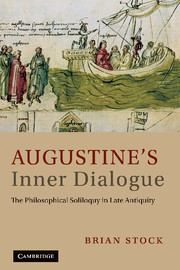2 - Soliloquy and self-existence
Published online by Cambridge University Press: 10 January 2011
Summary
Etenim qui secum loqui poterit, sermonem alterius non requiret.
Cicero, Tusc. Disp., 5.117Nearly all my writings are private conversations with myself. Things that I say to myself tête-à-tête.
Ludwig Wittgenstein, Culture and ValueINTRODUCTION
In the previous chapter I attempted to provide a sketch of some of the factors which contributed to Augustine's adoption of the soliloquy as his preferred form of spiritual exercise. Among these I singled out (1) the lengthy tradition of “spiritual exercises” in ancient thought; (2) Augustine's incorporation of interiorist themes into his outlook before joining the priesthood; (3) his discovery of Cicero's Hortensius, which convinced him of the value of philosophy; (4) his interest in Scepticism and Platonism, and the rôle of Platonism in providing a historical rationale for “Christian philosophy”; (5) his innovative thinking about body and mind, which abandoned the Platonic and Neoplatonic disdain for corporality in favour of a doctrine inspired by his reading of Paul, in which the body plays a central part in spiritual progress; and finally (5) his approach to interpretation, which encompassed his studies in grammar and rhetoric and was shaped into a powerful tool for inward self-scrutiny.
In this chapter I focus on one element in this group of forces, namely the soliloquy itself, and its use in the demonstration of self-existence. My argument is that Augustine is not only interested in refuting the Sceptical view that nothing can be known for certain, as he states in Contra Academicos and elsewhere, but that he also, and perhaps principally, envisages the cogito as an important element in constructing a narrative philosophy.
- Type
- Chapter
- Information
- Augustine's Inner DialogueThe Philosophical Soliloquy in Late Antiquity, pp. 62 - 120Publisher: Cambridge University PressPrint publication year: 2010

